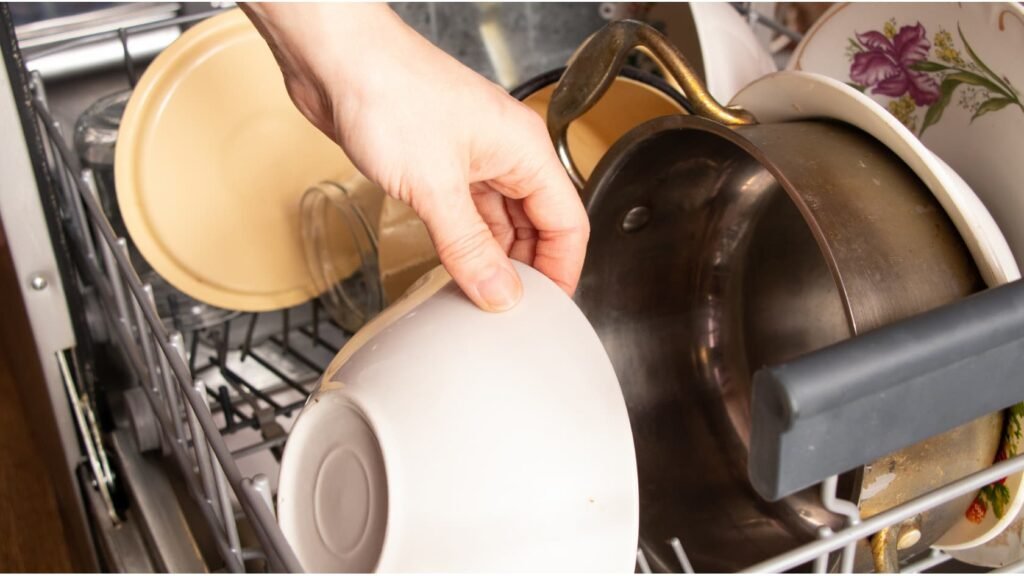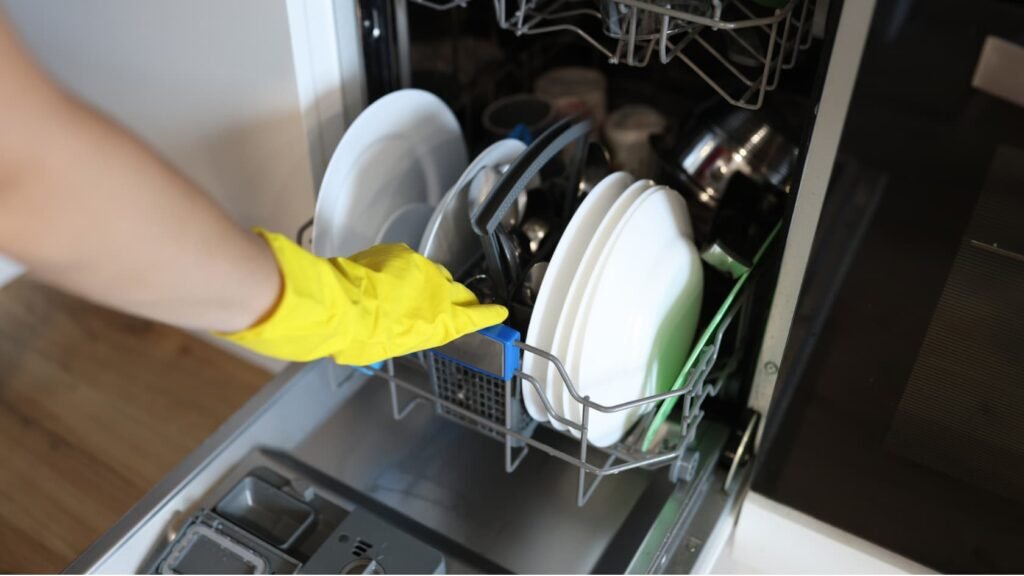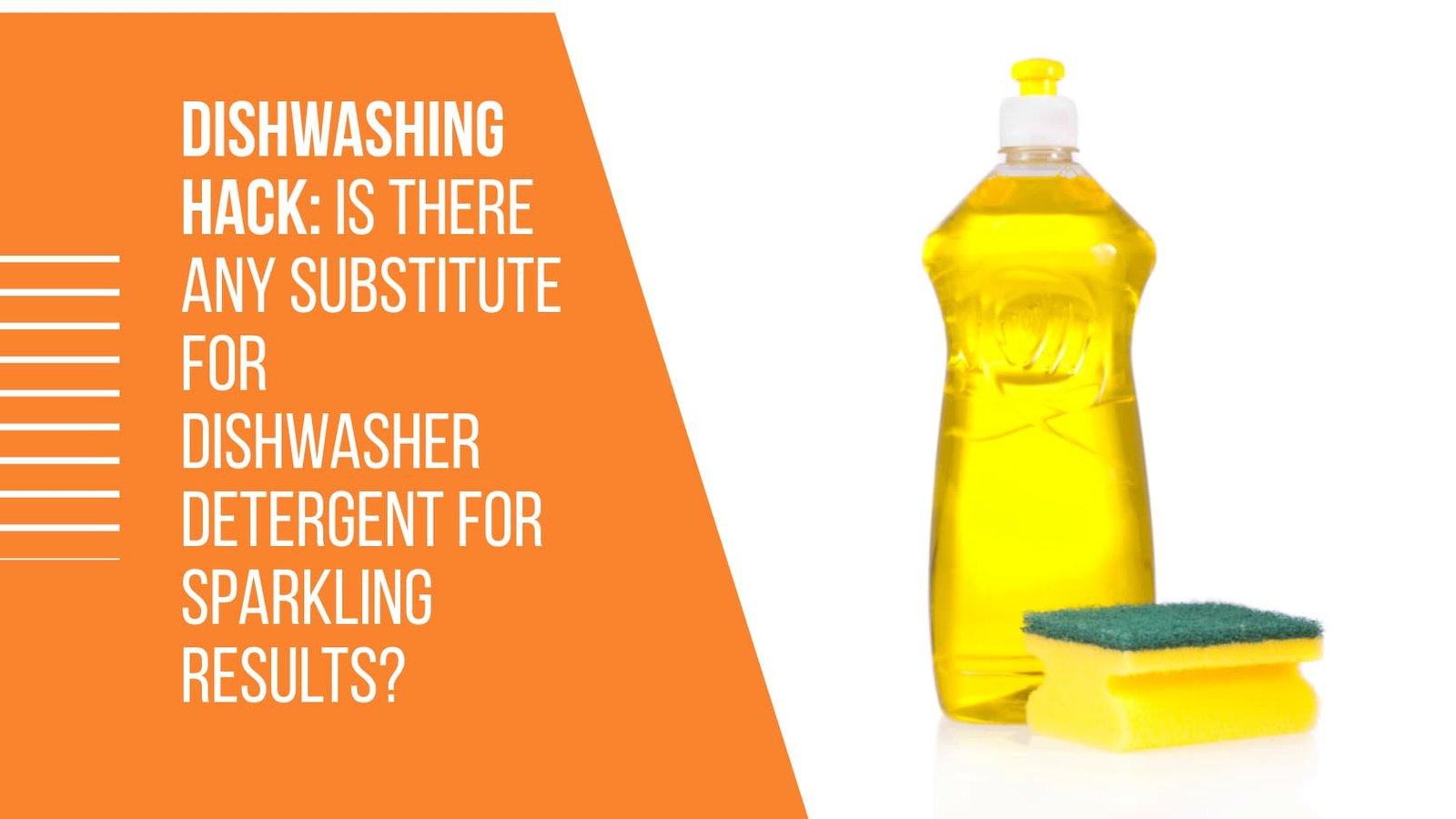Are you tired of always relying on dishwasher detergent for sparkling results? Is there any substitute for dishwasher detergent that can achieve similar results?
There might be an alternative that not only leaves your dishes clean but is also eco-friendly and cost-effective.
As we explore various substitutes for dishwasher detergent, you’ll discover the benefits of using natural alternatives and DIY recipes for your dishwashing needs.
Vinegar is a popular substitute for traditional dishwasher detergents.
Known for its cleaning properties, vinegar can be used in your dishwasher to achieve sparkling results while being gentle on the environment.
In addition to vinegar, the combination of baking soda and vinegar has also gained popularity as an effective dishwasher detergent substitute.
In this article, we will be exploring the effectiveness of these alternatives and their safety for your dishwasher.
Let’s discover how you can achieve sparkling dishes without relying solely on traditional dishwasher detergents.
Some links in this post are affiliate links, meaning, at no additional cost to you, we may earn a commission if you click through and make a purchase. As an Amazon Associate, I earn from qualifying purchases.
What Can I Use Instead of Dishwasher Detergent?

Running out of dishwasher detergent doesn’t mean you have to postpone doing the dishes.
There are several household items that can come to your rescue.
While these aren’t permanent replacements, they can work well in a pinch until you’re able to restock on your regular dishwasher detergent.
Vinegar as a Substitute
Distilled white vinegar is a powerhouse for numerous cleaning tasks, including being used as a substitute for dishwasher detergent.
Simply fill the detergent cup with the vinegar.
It’s an excellent agent for removing grease and hard water stains, ensuring your dishes come out spotless.
Also, vinegar is a natural deodorizer and can help eliminate odors from your dishwasher.
How to Use Vinegar in Your Dishwasher
If you find yourself out of dishwasher detergent, white vinegar can serve as an effective alternative. Here’s how to use it
Take a dishwasher-safe bowl.
Measure and pour 1 cup of white vinegar into the bowl.
Place the bowl on the top rack of your dishwasher.
You don’t need to add any detergent. Simply run the dishwasher on your normal cycle.
During the washing process, the vinegar will disperse, working to clean and deodorize your dishes as well as the dishwasher itself.
Vinegar is particularly good for cutting through grease and eliminating those hard water stains that can leave glasses looking cloudy.
Remember not to mix vinegar with bleach or any dishwashing products containing bleach, as it can create harmful fumes.
Also, though vinegar is a great natural cleaning agent, repeated use over time may damage the rubber components in your dishwasher.
So you should use it sparingly as a detergent substitute.
Benefits of Using Vinegar
Disinfectant Properties
Kills bacteria: Vinegar is a potent bactericide. It ensures your dishes come out not just visually clean but hygienically clean too.
Natural and non-toxic: It provides peace of mind, especially for households looking to minimize their exposure to synthetic chemicals.
Odor Elimination
Removes odors: As a natural deodorizer, vinegar eradicates unwanted smells, leaving your dishwasher and kitchen with a neutral scent.
Combat Hard Water
Breaks down deposits: Those pesky hard water stains meet their match with vinegar. It restores the shine to your glassware and cutlery.
Baking Soda and Vinegar Combination
For enhanced cleaning power, you can combine baking soda with vinegar.
Start by pouring a cup of vinegar into the bottom of the dishwasher.
Then, sprinkle a layer of baking soda across the bottom and run the dishwasher as usual.
This combination is effective for tackling tough food particles and eliminating odors, leaving dishes sparkling clean.
Steps to Create and Use This Mixture
Here’s a simple guide to making your homemade dishwasher detergent using baking soda and vinegar.
Ingredients:
1 part baking soda
1 part vinegar
Steps:
Combine equal parts of baking soda and vinegar in a small container or bowl. You’ll notice the mixture starts to fizz and bubble—the sign of a chemical reaction that helps to lift grime and tackle bacteria.
Once the initial reaction settles, give the mixture a quick stir to ensure it’s well combined.
Usage:
Deposit a small cup of the mixture into the bottom of the dishwasher or pour directly into the detergent compartment.
Run the dishwasher cycle as usual.
Why This Combination Works Well
The dynamic duo of baking soda and vinegar comes into play when you need a substitute dishwasher detergent. Let’s break down why this mixture is efficient:
Baking Soda
Abrasive Power: Baking soda serves as a gentle abrasive. This means it can scrub away tough stains without causing harm to your dishes.
Deodorizing: It also neutralizes foul odors, ensuring your dishes come out smelling fresh.
Vinegar
Sanitization: The acidic properties of vinegar make it excellent for killing off bacteria and sanitizing your dishes.
Removes Odors: Similar to baking soda, vinegar is a strong deodorizer.
The Reaction
Fizzing Action: When combined, they fizz. This reaction helps to dislodge food particles and grease, making them easier to rinse away.
The Result
Sparkling Clean: Together, they soften water and enhance shine, leaving you with remarkably clean dishes after every cycle.
Lemon’s Grease-Cutting Power
Another natural substitute is using lemon juice.
Its acid content is great for cutting through grease and can leave a fresh scent behind.
You can pour the lemon juice into the detergent cup or place a small bowl filled with it on the top rack during the wash cycle.
It’s a gentle, eco-friendly alternative that effectively cleans without harsh chemicals.
Reuse any airtight container to store your homemade dishwasher detergent substitute to ensure that the active ingredients remain potent and effective.
This also prevents any absorbing of odors or moisture, which could impact their cleaning efficiency.
Using Lemon as a Natural Alternative
The citrusy power of lemon not only cuts through the grease but also leaves your dishes with a refreshing scent.
Simply pour a ½ cup of lemon juice into the detergent compartment, or directly into the bottom of your dishwasher, just before you start the cycle.
The acidity in lemon juice works wonders on greasy residue, ensuring that your dishes come out spotless and with a lemon-fresh aroma.
Additional Benefits for Your Dishwasher
Lemon juice is not just for dishes. It’s a multitasking agent that keeps your dishwasher in top shape.
Regular detergents might clean well but using lemon juice has added benefits.
Its natural acidity plays a crucial role beyond grease-busting. It tackles the unseen foes within your dishwasher, like soap scum and mineral deposits.
When used in dishwashers, lemon juice not only works on the surface level for your utensils but also dives deeper.
What Makes a Substitute Safe or Unsafe?

A safe dishwasher substitute is typically characterized by its non-abrasive nature and low sudsing properties.
Lemon juice, vinegar, and baking soda are deemed appropriate because they do not create excessive bubbles that could cause overflowing and leaks or harm to electronic components.
On the other hand, unsafe substitutes include suds-producing products like hand soap, laundry detergent, and shampoo.
These create foam meant for different cleaning processes and are not suitable for the mechanics of a dishwasher’s operation.
Precautions to Take
When using substitutes in your dishwasher, it’s wise to follow certain precautions to maintain the safety and efficiency of your appliance.
Here are some key considerations
Use Moderate Amounts: Excessive use of even safe substitutes can cause problems. Vinegar, for instance, can corrode rubber parts over an extended period because of its acidity.
Avoid Sudsy Products: Stay clear of substances designed to generate a lot of suds.
Rinse Well: Run an empty dishwasher cycle after trying a new substitute to ensure no residual substance is left that could impact subsequent washes.
Tips to Avoid Damaging Your Dishwasher
To minimize any risks associated with using substitutes in your dishwasher, consider the following tips
Dilute Acidic Substitutes: Mix vinegar or lemon juice with water to reduce their potential corrosive effects.
Alternate Use: Regular use of a single substitute can lead to residue buildup or wear, so try alternating cleaners.
Monitor for Changes: Observe your dishwasher’s performance and the cleanliness of your dishes to detect any issues early on that could be caused by a substitute.
Benefits of Using Natural Substitutes
When we discuss the environmental and economic benefits of using natural substitutes for dishwasher detergents, a few core advantages stand out
Reduced Chemical Use: The use of natural ingredients like vinegar, baking soda, and lemon juice means fewer harsh chemicals entering our water systems.
Biodegradable Solutions: These natural substances break down safely in the environment, providing a greener cleaning cycle.
Cost Savings: Opting for economical, natural alternatives to pricier commercial detergents can lead to substantial long-term savings.
Less Packaging Waste: Purchasing larger quantities of natural ingredients can minimize the environmental impact of packaging waste, contributing to a cleaner planet.
Long-Term Use Considerations
While the shift towards natural substitutes offers many advantages, it’s important to weigh these against potential challenges that may arise with extended use
Cleaning Efficacy: It is vital to monitor the effectiveness of natural substitutes, as they may not always tackle tough greasy stains or heavily soiled dishes as commercial detergents do.
Impact on Appliance: Repeated use of acidic alternatives like vinegar could potentially harm parts of your dishwasher, so it’s essential to keep an eye on the condition of your machine.
Rotating Substitutes: Implementing a rotation between various natural cleaning agents can help prevent residue buildup and maintain cleaning efficiency.
Complementary Strategy: Some might find the perfect balance by using natural substitutes for day-to-day washing and traditional detergents for more challenging jobs. This blended approach allows households to enjoy the best of both worlds.
Customizing Your DIY Dishwasher Detergent
To tailor your homemade detergent to the specific conditions of your water supply, small adjustments can be made with great effect.
For hard water, which is known to leave mineral deposits, incorporate more citric acid or a separate rinse aid like white vinegar to combat residue.
An additional ½ cup of food-grade citric acid to your chosen mixture should significantly reduce hard water spots.
On the contrary, if your home has soft water, cut down the soap content in your recipes to avoid excessive sudsing, which can cause soap residue.
Include more baking soda as a suds regulator to maintain spotless and clear results on your dishware.
What Not to Use as a Dishwasher Detergent Substitute
While it’s great to explore alternatives to dishwasher detergent, it’s crucial to understand that not all substitutes are safe or appropriate.
Some common kitchen and cleaning items can actually cause more harm than good to your dishwasher and dishes.
Here’s what you should avoid using as a dishwasher detergent substitute:
Common Mistakes to Avoid
Hand Soap and Laundry Detergent: These might be effective for hand washing or in the washing machine, but they generate too many suds for your dishwasher. This excessive foaming can lead to leaks, overflow, and potentially damage the electronic components of your appliance.
Bleach: While bleach is known for its disinfecting power, using it in your dishwasher, particularly one with stainless steel parts, can be a recipe for disaster. Bleach can lead to corrosion and rust, shortening the lifespan of your machine.
Ammonia-Based Cleaners: Ammonia can be too abrasive for the inner workings of your dishwasher. It has the potential to crack or damage the plastic and rubber parts, leading to leaks or other mechanical issues.
Conclusion
In the quest for a cleaner, more sustainable home, utilizing eco-friendly dishwasher detergent substitutes is not only prudent but preferable.
Vinegar, baking soda, and lemon juice emerge as leading alternatives. They offer an effective clean without the chemical footprint of conventional detergents.
These natural cleaners deliver the dual benefit of pristine dishes and a reduced environmental impact due to lower chemical runoff and diminished packaging waste.

Pazi Mboh, our Home Efficiency Advocate, is dedicated to promoting sustainable dishwasher use. His tips on energy and water efficiency not only help the environment but also save on your bills, making his guidance invaluable for eco-conscious households.





